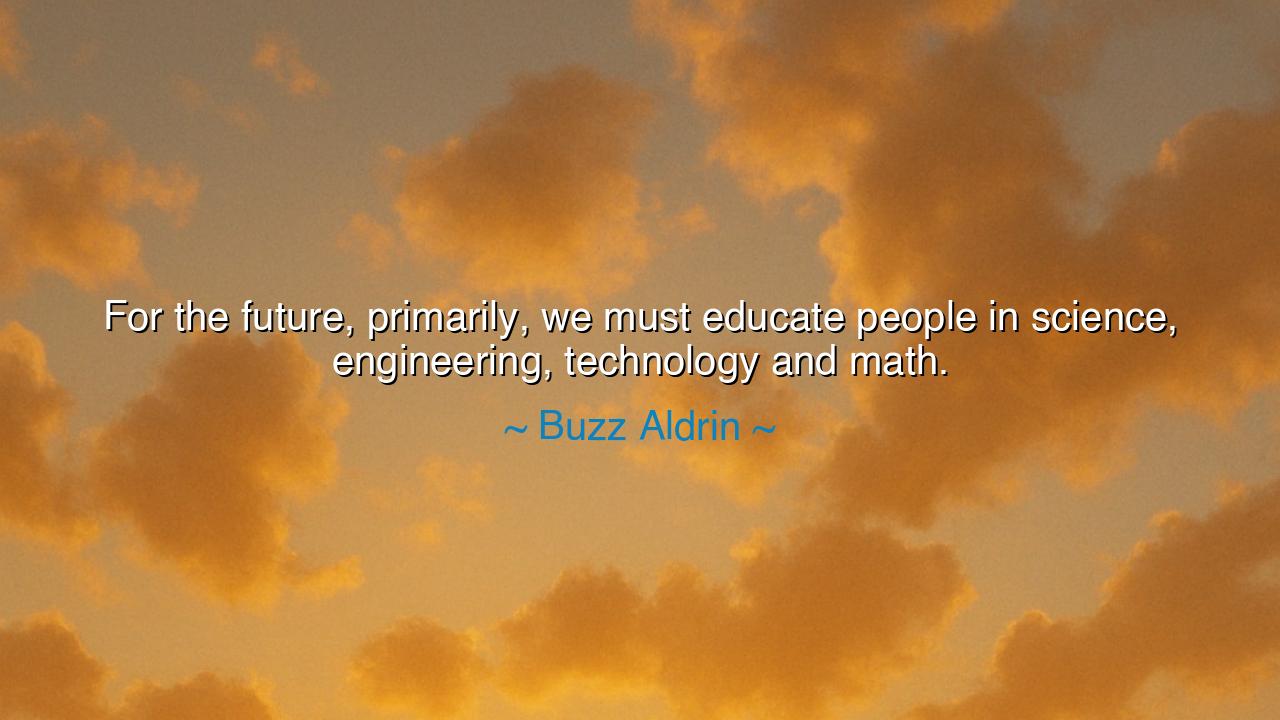
For the future, primarily, we must educate people in science
For the future, primarily, we must educate people in science, engineering, technology and math.






In the grand sweep of history, there are moments when humanity is called not to dwell in the present, but to look boldly into the future. One such call was made by Buzz Aldrin, a man whose very name is synonymous with the exploration of the unknown: "For the future, primarily, we must educate people in science, engineering, technology and math." These words carry with them the weight of vision and foresight, for Aldrin, a man who journeyed to the very surface of the moon, understands that the future of humanity rests not in the comforts of the present, but in the relentless pursuit of knowledge that drives us forward. Science, engineering, technology, and math are the keys that will unlock the doors to our collective destiny.
In ancient times, the philosophers and scholars of the great civilizations saw knowledge as the cornerstone of human progress. Plato believed that the pursuit of knowledge, especially knowledge that could be applied to the betterment of society, was the highest calling of the human soul. The great Greek mathematician Pythagoras looked to numbers and shapes as the foundation of all understanding, seeing mathematics as a way to unlock the mysteries of the universe. Their teachings held that education was not just about understanding the world in which we live, but about preparing the next generation to carry the torch forward, to build upon what came before, and to reach higher and farther than anyone thought possible. In this light, Aldrin's call to educate in the fields of science and mathematics is a continuation of that ancient wisdom.
The story of ancient explorers and pioneers is one of endless learning, of seeking knowledge in the face of the unknown. Christopher Columbus, though driven by a vision of a new world, had to rely on the scientific knowledge of his time—the mathematics of navigation, the technology of the ship, and the understanding of the stars. The great exploration of space, an endeavor to which Aldrin devoted his life, mirrors this journey. It is an extension of the voyages that began centuries ago, but with a new, bold aim—to reach not just distant lands, but other worlds. Like Columbus, Aldrin and his fellow astronauts were armed with the tools of science and engineering—tools that allowed them to break free from the confines of Earth and set foot on the surface of the moon. It was not blind courage that took them to space, but the application of centuries of accumulated knowledge.
But Aldrin’s words are not just a reflection on the past; they are a call to action for the future. As we stand at the precipice of new discoveries—in space exploration, artificial intelligence, medicine, and energy production—it is clear that the future of humanity depends on our ability to continue pushing the boundaries of knowledge. The fields of science, engineering, technology, and mathematics are the engines of progress, and it is through these disciplines that we will build the future. The challenges that lie ahead—be they the exploration of distant planets, the fight against climate change, or the pursuit of health and well-being for all—will require minds that are trained in these fields.
Look, O children of the future, to the story of Marie Curie, whose work in radioactivity changed the course of science forever. Curie was not just an isolated genius, but part of a larger tradition of thinkers who sought to understand and shape the world. Her discoveries in science laid the groundwork for the medical technologies that we take for granted today. Just as the ancient philosophers and explorers sought to uncover the mysteries of the world, Curie and others like her pushed the boundaries of knowledge to create a future of possibility. Aldrin’s vision is no different—he calls on you to follow in the footsteps of these great minds, to reach higher, explore further, and use the tools of science to solve the challenges of tomorrow.
The lesson in Aldrin’s words is one of urgency and hope. The future is not something to be feared, but something to be shaped. It is through education in the disciplines of science that we will empower the next generation to face the challenges that await. But Aldrin’s message is not just for those who will become scientists; it is a call to every individual. Science and technology shape all aspects of our world, from the medicine we rely on to the communications that connect us. Each of you has a role to play in this future, whether you are an engineer designing the next great breakthrough, a teacher inspiring the minds of the young, or a leader guiding society through the complexities of the future.
O children of the future, heed this call: the future belongs to those who seek to understand the world and push its boundaries. Science, engineering, technology, and math are not mere subjects—they are the means by which you will craft the world to come. The knowledge and tools you gain in these fields will shape the future of humanity, guiding you to new heights, new worlds, and new possibilities. Learn well, for in your hands lies the power to create a future that is brighter, more connected, and more just. Just as the ancient explorers charted new realms, so too must you chart the future, using the knowledge of today to reach the unknown lands of tomorrow.






AAdministratorAdministrator
Welcome, honored guests. Please leave a comment, we will respond soon